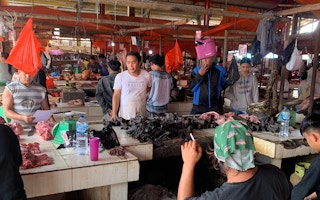Content warning: readers may find some of the images in this story disturbing.
It is Saturday morning, the busiest time of the week for the bustling Pasar Ekstrim (extreme market) in the mountain city of Tomohon in North Sulawesi, Indonesia. Butchers swing machetes at wild pig and dog meat, cut the wings off bats, smoke rats and blow-torch the flesh of reticulated python to rid it of ticks and other parasites.
Markets like these have existed in this part of Indonesia for hundreds of years. Hunting and eating animals from the surrounding forests is an ancient tradition of the Minahasa, an Indigenous ethnic group that is famous for its fondness for foods that might unsettle the stomachs of the faint-hearted visitor.
“Adam and Eve would not have eaten the forbidden fruit and been expelled from the Garden of Eden, if only the Minahasa people had devoured the serpent,” jokes Yvonne Lasut, a 46-year-old church administrator, who enjoys eating dog, rat, bat, snake and – until it was banned from the market a few years ago – the Crested black macaque, a species of monkey that like many fauna in Sulawesi can only be found in this part of the world.
Anyone in the market caught selling the critically endangered Crested black macaque, or other vulnerable species such as the Spectral tarsier, an adorable, moon-eyed primate also only found in Sulawesi, can find themselves serving a seven- to eight-year jail sentence, although numerous sources Eco-Business spoke to said that these animals can still find themselves on dinner plates at the right price, particularly during festive periods.
In recent months, calls have grown for stricter sanctions to curb the trade in protected animals in Indonesia. Lawmakers are discussing the revision of an act that came into force in 1990 to prohibit such trade for the conservation of wildlife and ecosystems, which many say still imposes insufficient penalties. Amendments up for debate include increasing the minimum jail terms and fines for wildlife trade-related offences.
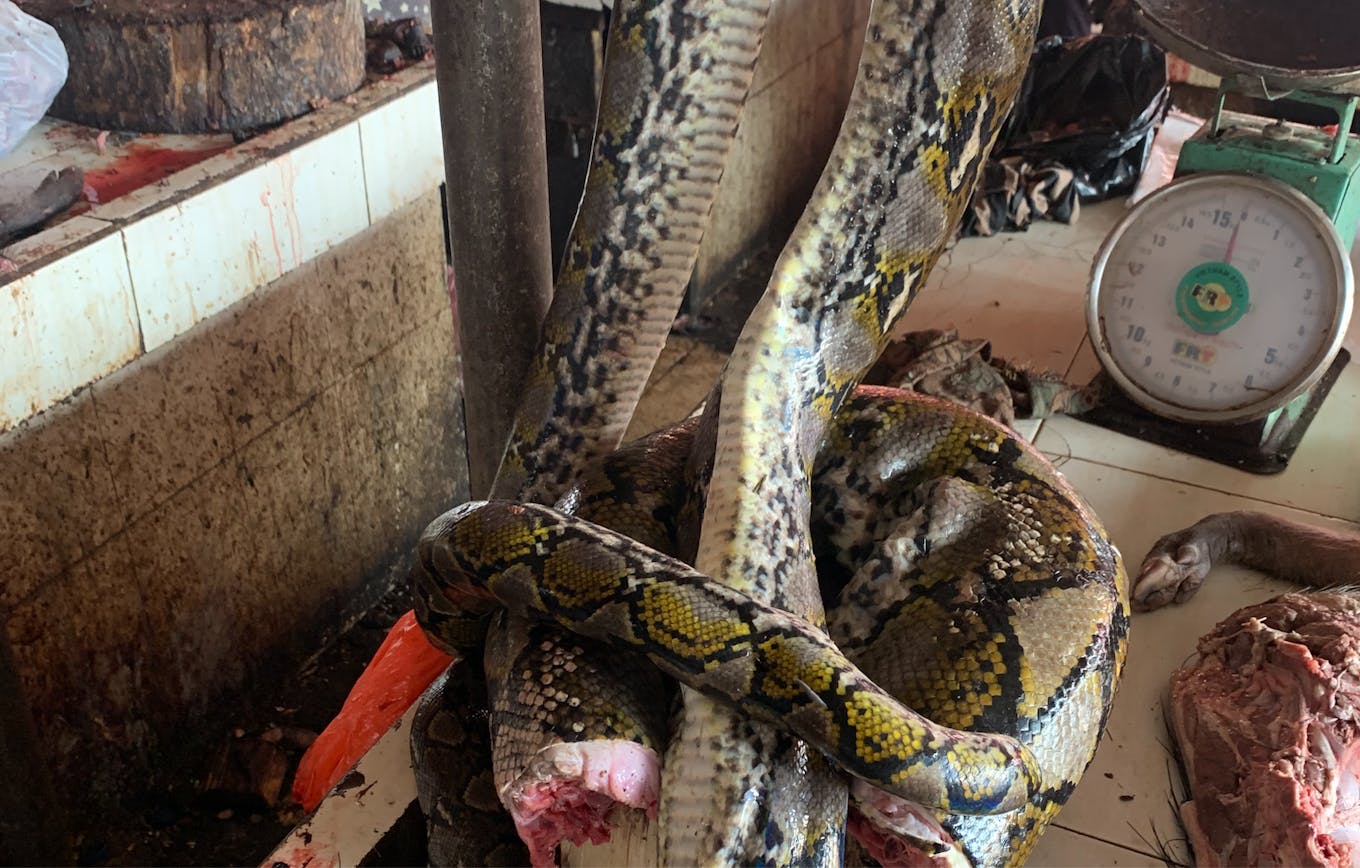
Reticulated python on display at Pasar Ekstrim, Tomohon, Indonesia. Image: Robin Hicks / Eco-Business
Bushmeat markets like the one in Sulawesi that have resisted pressure to close even amid the Covid-19 pandemic – which cast a spotlight on the risks of viruses transmitted by the trade in wild mammals – show that wild meat is still very much a part of the local diet and that the markets could be hard to shutter. This concerns conservationists, as beyond land-use change, hunting is a major threat to Sulawesi’s extraordinary biodiversity. The island is home to more endemic species than anywhere on the planet.
“If you can pay for it, you can eat it,” says one local restaurant owner who preferred to remain anonymous.
On the menu
For now, none of the animals for sale at Pasar Extrim are threatened with extinction, though some are unique to the region (endemic), like the White-tailed rat, a forest-dwelling rodent whose population is believed to be in decline as a result of overhunting.
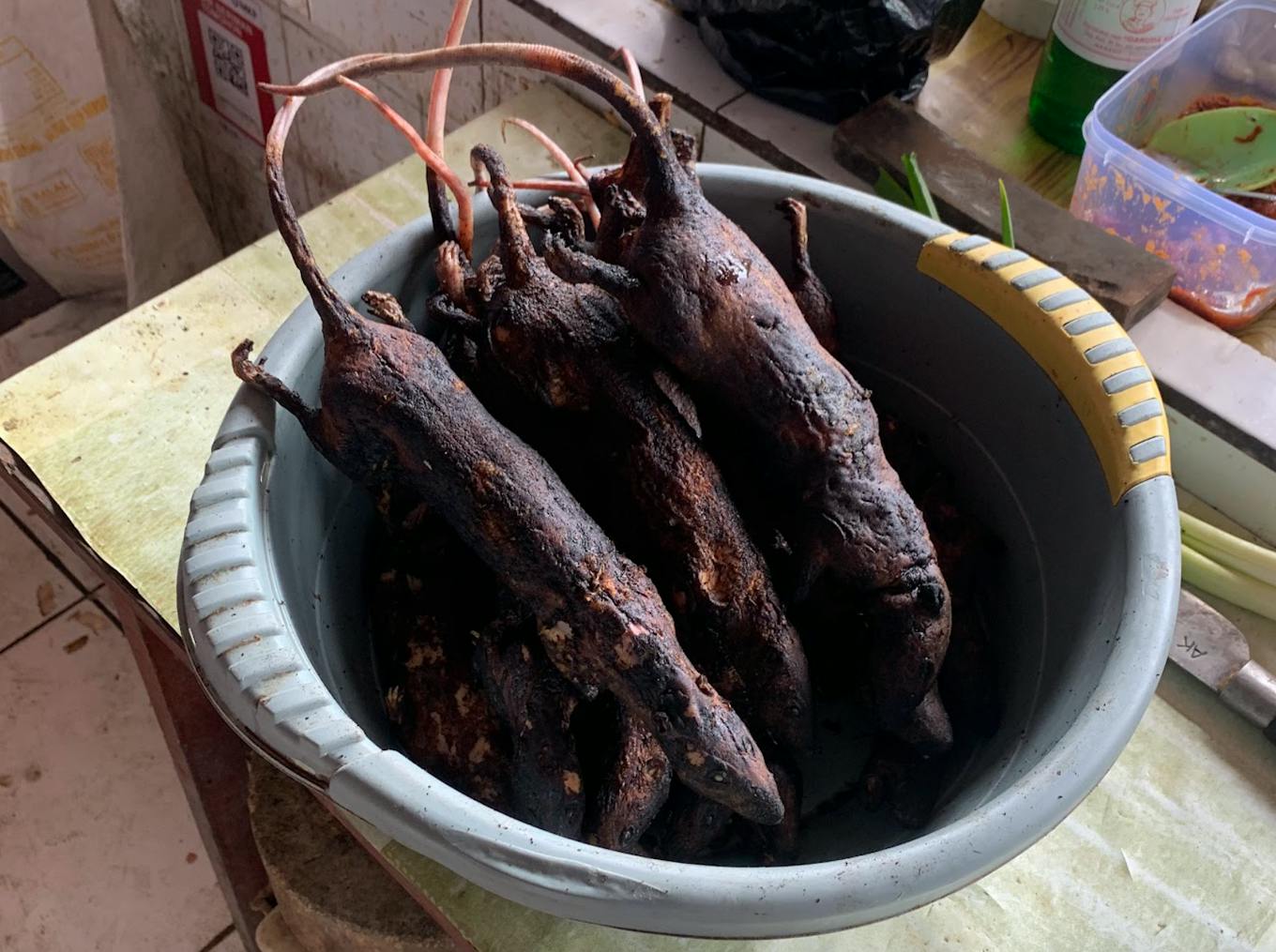
White-tailed rats, which are endemic to Sulawesi, for sale at a market in Tomahon. Image: Robin Hicks / Eco-Business
Reticulated pythons, highly adaptive animals which are found all over Southeast Asia including urbanised Singapore where they thrive, are typically sourced from Makassar in South Sulawesi, and sold at the market for IDR50,000 (US$3.20) per kilogramme (kg). The animals are slaughtered in the wild using machetes.
Reticulated pythons are the world’s longest snakes, growing up to 10 metres in length. Though they are not classified as endangered, they face a range of threats, including hunting for food and skin. Kering, the company behind fashion brands Gucci, Saint Laurent and Alexander McQueen, recently opened a python farm in Thailand. Pythons are also used in traditional medicine and sold as pets.
Fruit bats, are caught using nets to trap the animals as they fly through the forest, and are sold for IDR30,000 (US$1.90) each. According to Lasut, they taste like a mixture of chicken and pork.
Wild pigs, which are hunted using dogs or caught in snares, are currently the most expensive animals for sale at the market, going for IDR80,000 (US$5.12) per kg. An outbreak of African swine flu, which has a 90 per cent mortality rate and has affected an estimated 500,000 pigs in Indonesia at the time of publishing, has pushed the price of pig up.
Most of the domestic and wild animals for sale can also be eaten at the market, typically served in spicy curries.
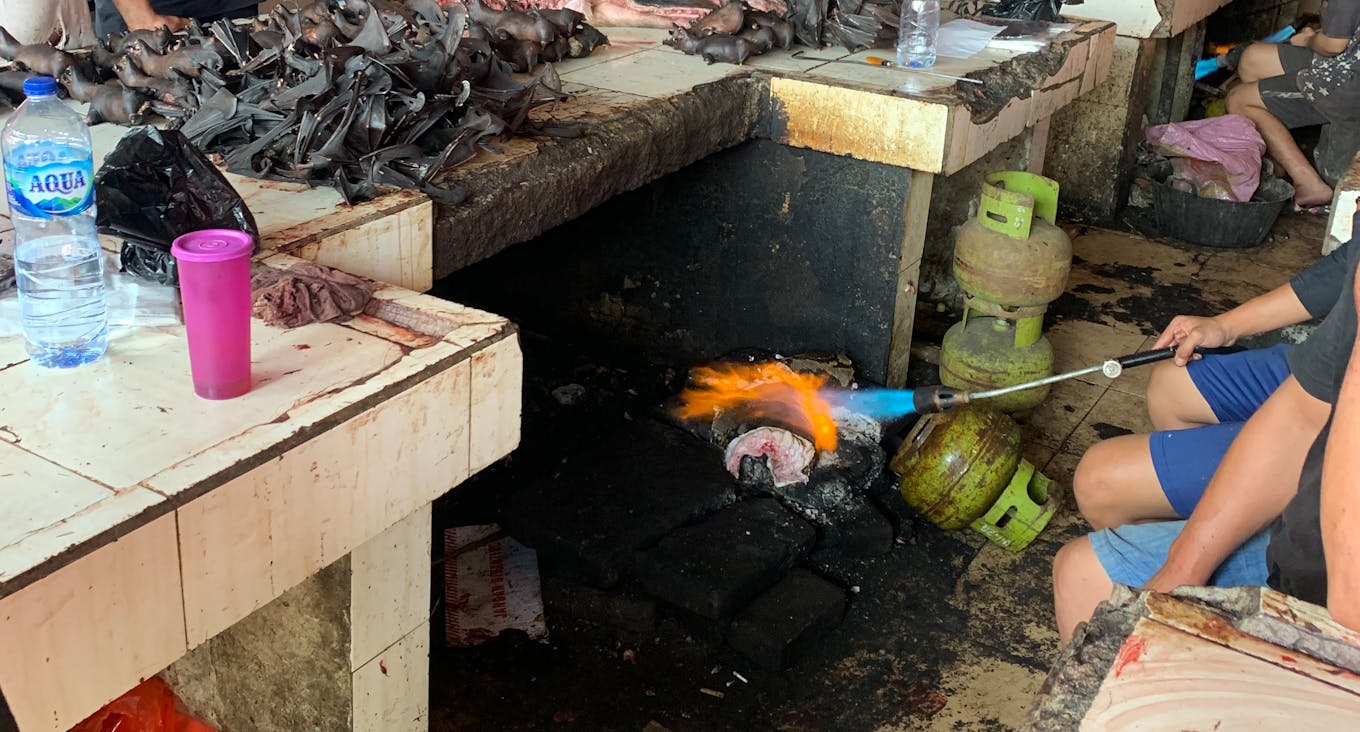
At the market, pythons are torched to rid them of parasites before they’re sold. Image: Robin Hicks / Eco-Business
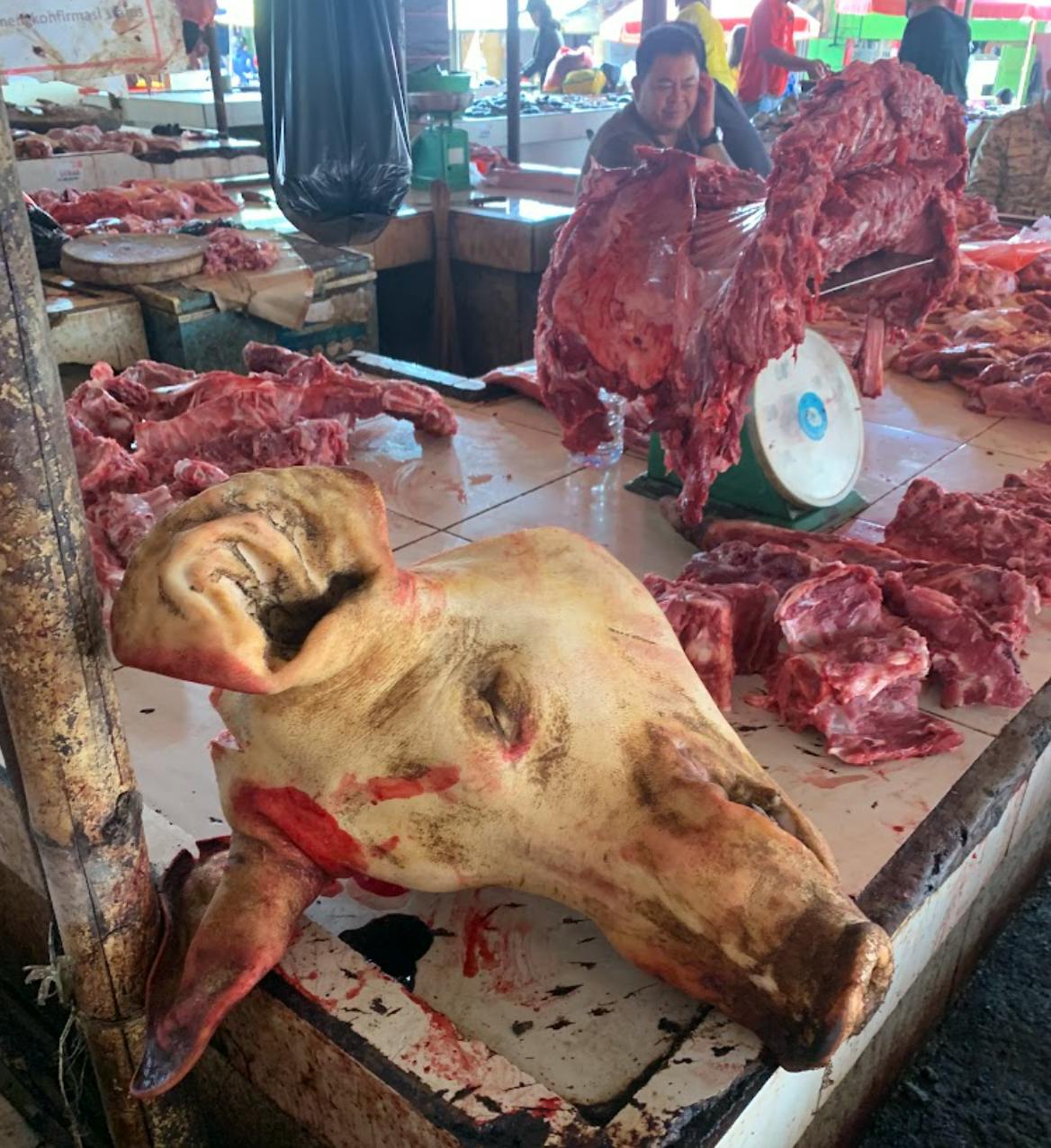
A wild pig head sits on a bloodied butchering slab at the bushmeat market in Sulawesi, Indonesia. Image: Robin Hicks / Eco-Business
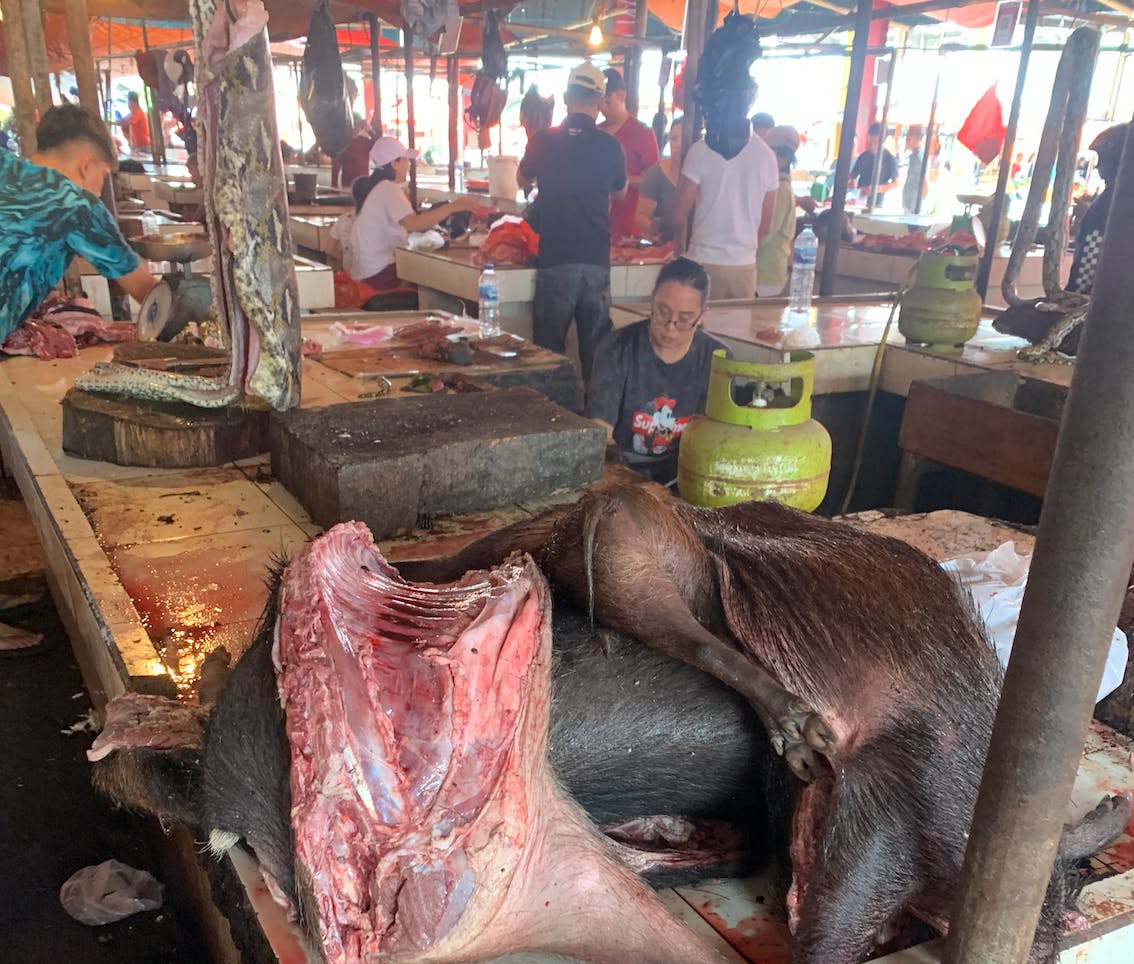
Butchered wild pig is stacked in a pile at the bushmeat market. Image: Robin Hicks / Eco-Business
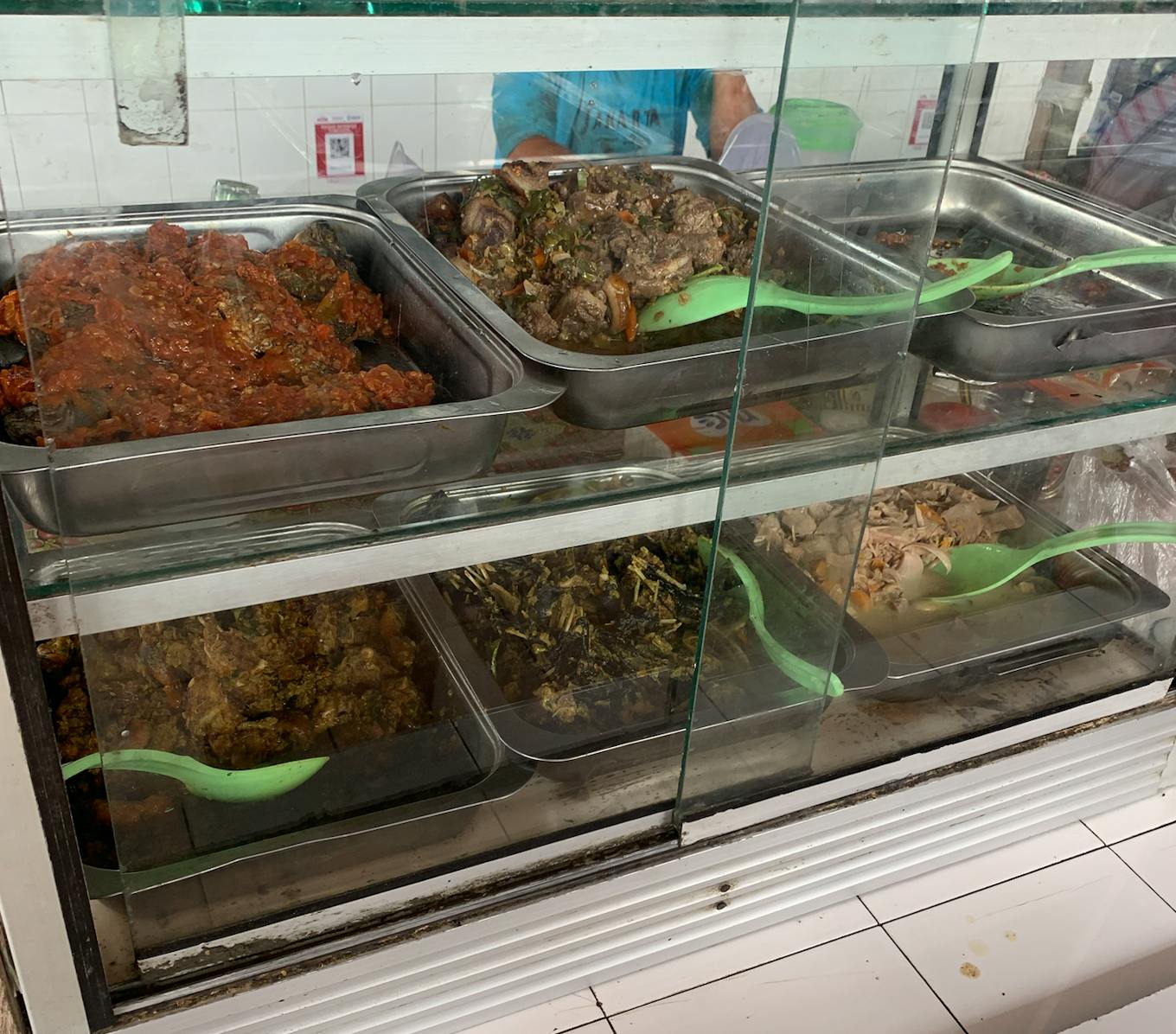
Bat and rat meat for sale in curries at Pasar Ekstrim. Image: Robin Hicks / Eco-Business
Dogs are no longer slaughtered at the market. A 2023 campaign by animal welfare group Humane Society International and local partner Animal Friends Manado Indonesia (AFMI) persuaded some traders to stop killing dogs and cats and try alternative sources of livelihood, but dog meat continues to be sold at the market.
Dogs were previously openly killed in public, using a hammer or the blow of a wooden club to the head, because customers prefer to choose the dog they eat while it is still alive. According to people Eco-Business spoke to at the market, killing dogs out of sight introduces new dangers for the people who eat it, as many dogs are poisoned using potassium, which contaminates the meat.
Minahasa people are believed to have eaten dog meat since the 1930s, when dogs that were previously used for hunting found themselves on the meal table during a period of war and famine. Like eating chicken and pork in the Christian-majority region, dog meat is not taboo and is typically eaten at funerals and other special occasions and is considered a delicacy.
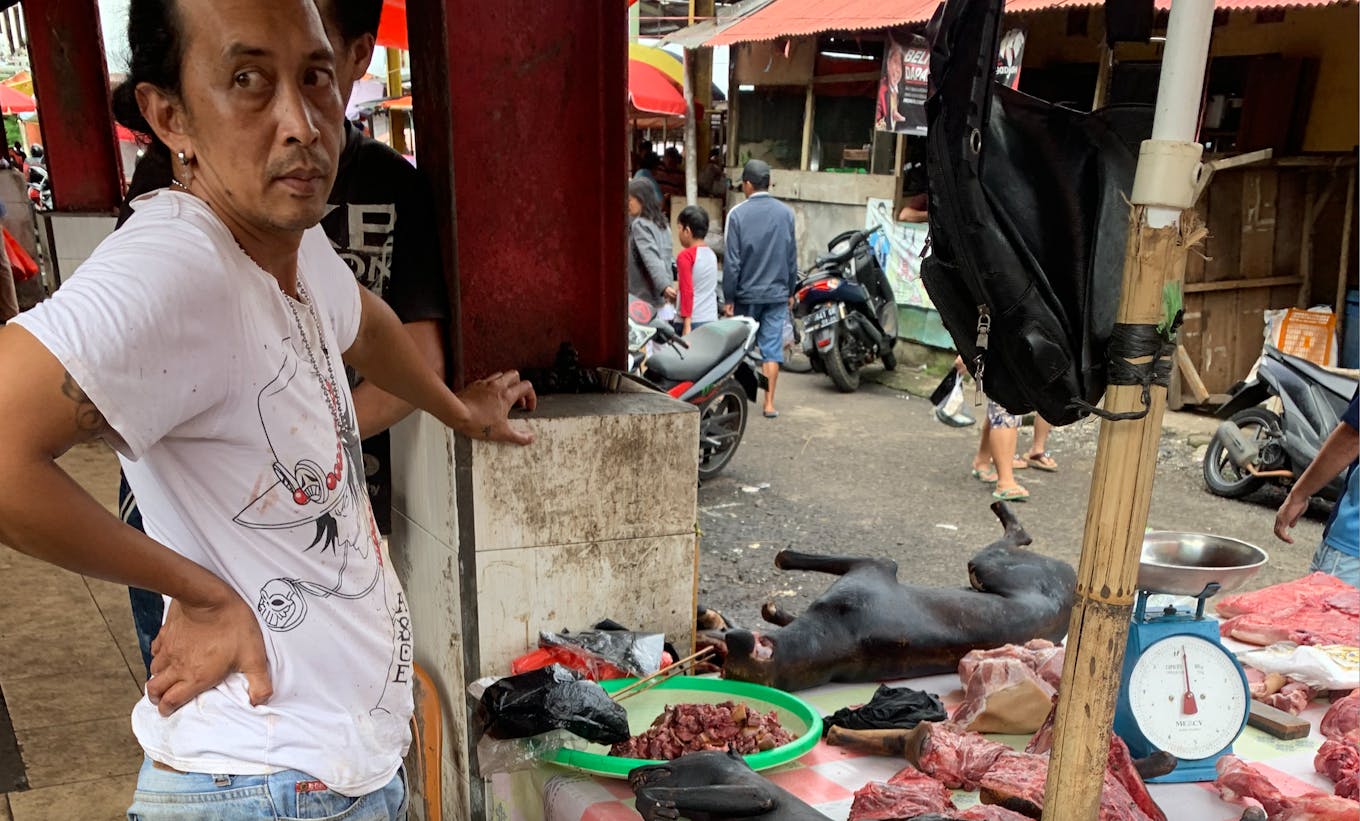
A market vendor minds a stall selling dog at Pasar Ekstrim. Image: Robin Hicks / Eco-Business
Beyond diets and the meat trade, the general treatment of dogs in Tomahon and elsewhere in North Sulawesi is not considered poor. Some locals who eat dog also keep dogs as pets. One man who works at the market selling dog meat has a pet dog, and told Eco-Business he would never consider eating his pet.
Eco-Business visited a local hot spring believed to have physical and spiritual healing properties, where a man was bathing his dog with shampoo. Lasut rescued her dog from a rubbish bin when he was a puppy. The mongrel, which is healthy and well fed, follows her wherever she goes, even when she is doing laps at the local military swimming pool.
Pandemic and rabies risks
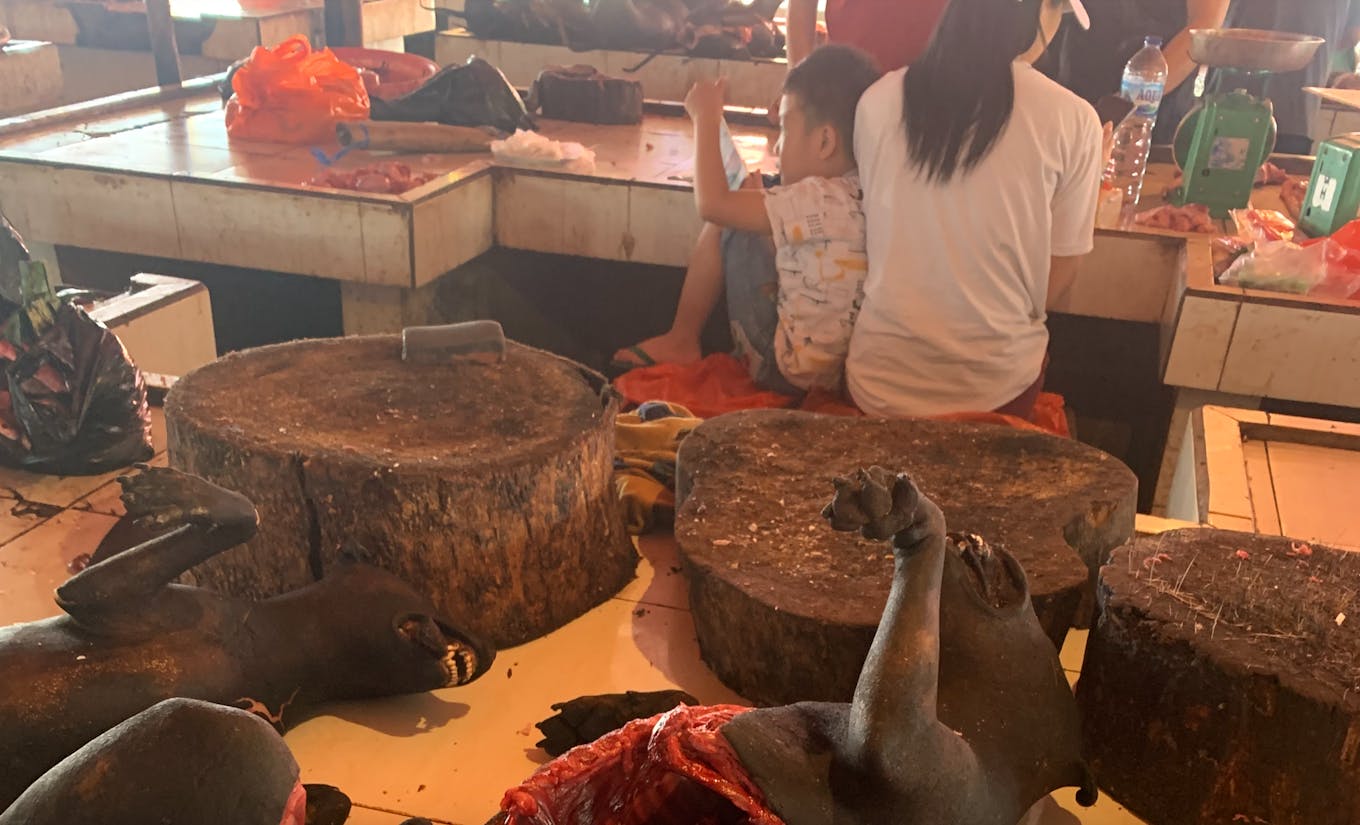
Dogs are no longer slaughtered at bushmeat markets, but dog meat continues to be sold. Image: Robin Hicks / Eco-Business
The dog meat trade is a potential reservoir of rabies, a zoonotic disease that causes unimaginable suffering in people and animals before they inevitably die. Through the transportation of dogs of unknown disease and vaccination status, the risk of rabies spreading increases. Dog catchers and butchers are rarely vaccinated.
Cases of human rabies have doubled in Indonesia since the pandemic, and cases in North Sulawesi have been among the highest in Indonesia. According to a study of 11 dog heads retrieved from the market by AFMI in 2016, three tested positive for rabies. Some animal welfare activists believe that the dog meat trade reduces rabies risk by reducing the free-roaming dog population, which is responsible for 99 per cent of human rabies cases.
Minahasa people also eat cats, another rabies carrier, although none are for sale at Pasar Ekstrim. Cat meat is “heaty”, it makes the body warmer – like eating Durian, says Lasut.
More worrying, perhaps, is the potential of Pasar Ekstrim, and other markets like it, becoming ground-zero for the next pandemic. Hygiene standards at the market are far from meticulous and various species of butchered animal lie side by side, exposed to the elements.
One theory for the cause of Covid-19 is that it was transmitted by a bat for sale at a wildlife market in Wuhan, China. Bats, hundreds of which are sold at Pasar Ekstrim every weekend, are notorious disease transmitters because of their powerful immune systems. The SARS (severe acute respiratory syndrome) virus, which killed 800 people in 2002, is believed to have originated in bats before spreading to civets in a wildlife market in China.
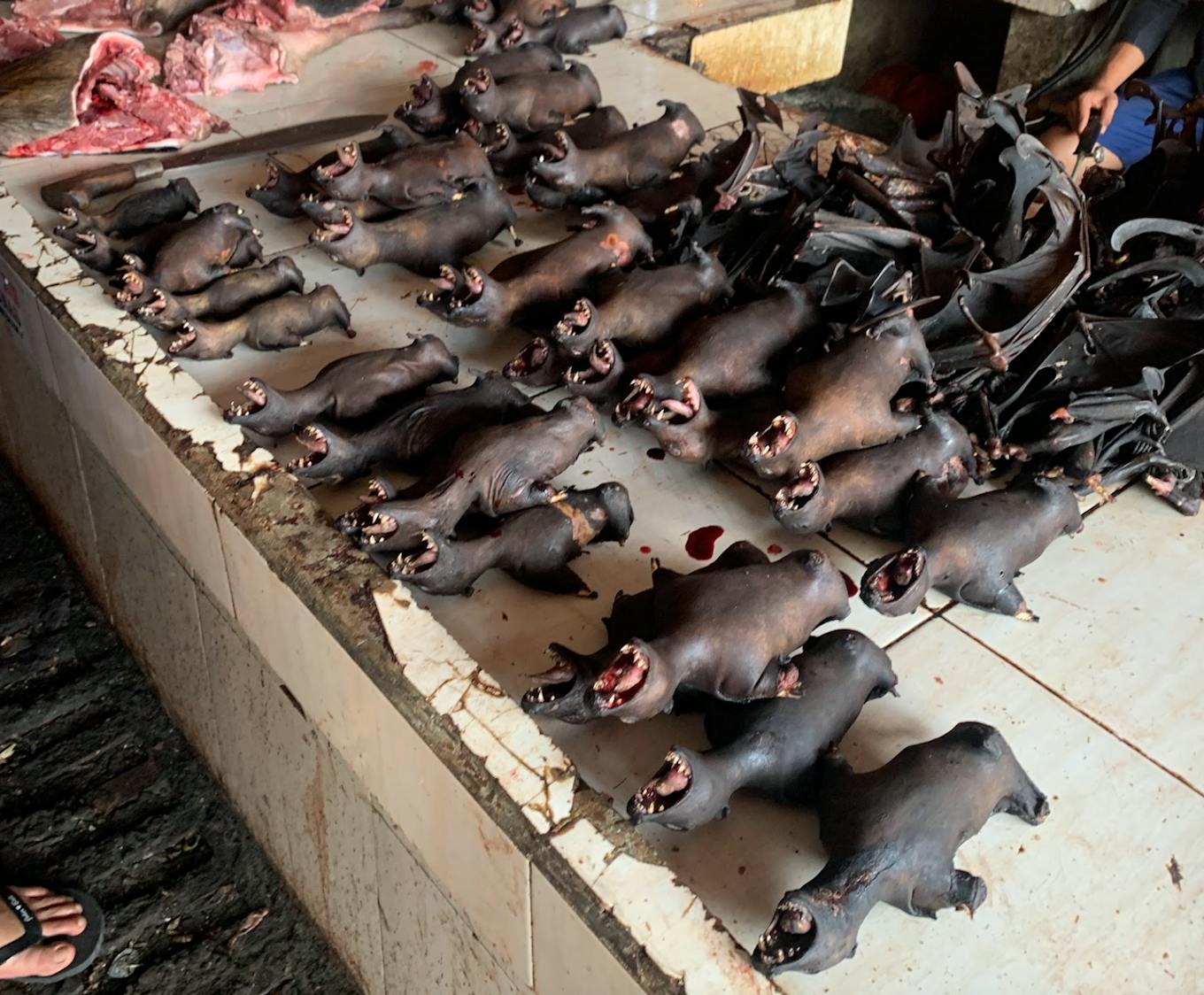
De-winged fruit bats for sale at Pasar Ekstrim. Image: Robin Hicks / Eco-Business
In 2021, Wildlife Conservation Society (WCS) and other conservation non-profits called on wildlife markets to be shut down, because of the pandemic risk they pose, particularly markets like Tomohon, which are located in urban areas where there are high concentrations of animals and people.
“The crowding together in urban markets of live wildlife and fresh meat from different species, close to people and other animals, provides the perfect conditions for recombination, sharing, and shedding of viruses and other pathogens and their transmission to humans,” WCS said in the paper, which was published at the height of the pandemic.
A 2016 study of six bats retrieved from Pasar Ekstrim by AFMI found that two of them tested positive for a strain of coronavirus. AFMI tried to use the test results to persuade the authorities to shut the market down in 2020, at the height of the pandemic, but AFMI executive Frank Delano Manus says his requests were ignored and the connection between bats and zoonotics diseases dismissed as a rumour. During the pandemic period, the market was shut down for just four days.
Manus says that one lever that can be used to close the bushmeat market down is tourism. A poll of foreign visitors to the market by AFMI in 2016 found that 80 per cent disapproved of wildlife and domestic animals being sold at the market.
Another lever is public safety. According to an investigation of the wildlife market supply chain by AFMI, most animals for sale at the bushmeat market are captured and killed in other parts of Sulawesi, transported and stored in iced boxes, and are not sold for up to two weeks after slaughter.
An alternative to Indonesia’s bush meat trade
A little over two and a half hours’ drive from Tomohon’s wildlife market is a nature reserve packed with a bewildering diversity of animal species that can only be found in North Sulawesi. Tangkoko national park offers a glimpse into how the region’s unique animals can avoid serious population declines and extinctions – eco-tourism.
Batu Putih Ecotourism Park is the gateway for the Tangkoko-Batuangus Nature Reserve, which covers an area of over 8,700 hectares, and is home to endemic species such as black crested macaque, babirusa, or deer-pig, which is renowned for its large tusks, and various species of tarsier, the world’s smallest primate.
Management of the park could be better. Guides shine flash lights into the sensitive eyes of noctural tarsiers so that visitors can take clearer photos of the animals at dusk, and one guide said that a Chinese tourist had paid IDR50,000 (US$3.20) for a python to be removed from a tree for a photo opportunity.
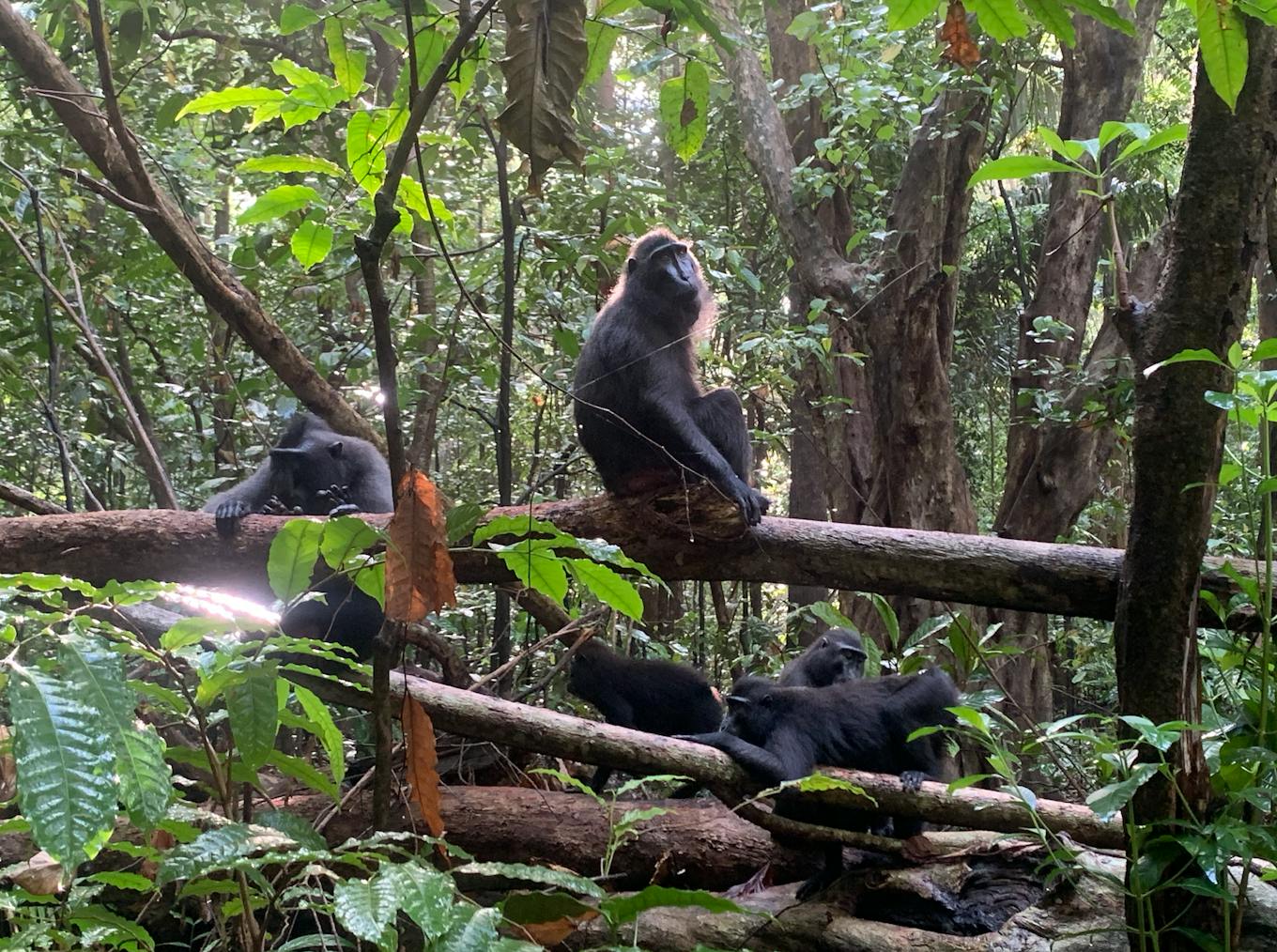
Sulawesi Crested black macaques. Image: Robin Hicks / Eco-Business
But eco-tourism could provide an alternative livelihood source for would-be poachers and convince people living in the area that keeping wildlife alive has economic value. Local villagers have been taught to identify wildlife species by guides, so that they can help to monitor populations and are more invested in their protection and could themselves work as guides. Various media companies, including most recently the BBC, have visited the area to document the wildlife, and locals can earn up to IDR350,000 (US$22.50) a day just from carrying camera equipment.
The push for stronger legal sanctions against wildlife trafficking is also largely due to the growing online trade of protected species.
“We have a lot of regulations, but none are properly enforced,” says Manus. “Money can buy everything here.”

